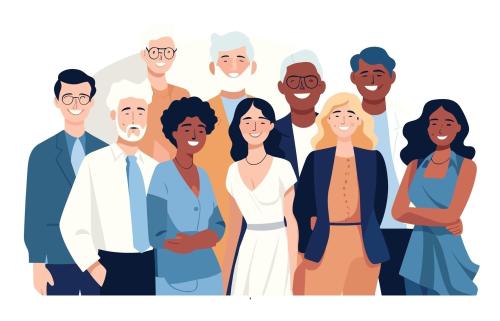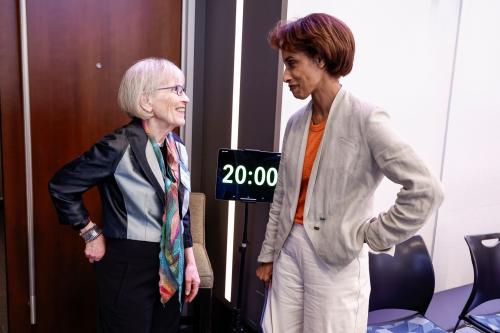Recent weeks have seen a blizzard of media stories and reports, including one from the Council of Economic Advisors, about whether the War on Poverty was a success. What a surprise—Democrats tend to say it worked wonders while Republicans judge it to be a flop. However, there is one impact of President Johnson’s War on Poverty that everyone should agree has been a terrific success, although a future problem looms. I’m referring to the positive impacts of the War on Poverty on the health, life expectancy, and poverty rates of the elderly. The three programs that account for these impacts on the elderly are Social Security, Medicare, and Medicaid. Johnson expanded the first and created the second two.
Eligibility for Social Security is based primarily on insurance principles and does not involve a means test. Rather, the benefit is an earned insurance payment in the sense that money is deducted from nearly everyone’s earnings, beginning with the first dollar, and credited to an individual account for nearly every worker in the U.S. Then at retirement, the Social Security Administration makes some complicated calculations to determine the size of each individual’s Social Security benefit. The benefit bears a rough relationship with the history of an individual’s earnings, with the important exception that the formula works in such a way that as a ratio of benefits to earnings, the benefits are progressive. Generally, Medicare works in similar fashion – people pay into an account in exchange for health insurance protection when they are elderly. As Eugene Steuerle and Caleb Quakenbush of the Urban Institute show in a 2013 report, an average two-earner couple retiring in 2010 will have paid lifetime taxes of $747,000 to Social Security and Medicare combined and will receive lifetime Social Security and Medicare benefits of $985,000. The ratio of benefits received to taxes paid is higher for low-income couples and lower for wealthy couples.
The major benefit of the Social Security program is to increase retirement income and thereby help the elderly avoid poverty and all that poverty implies. The Census Bureau’s annual poverty data show just how effective Social Security has been in fighting poverty. In 1966, a year after Johnson expanded Social Security and enacted Medicare and Medicaid, elderly poverty was 28.5 percent. By 2012, it had fallen to 9.1 percent, a decline of about 68 percent. An analysis by Gary Engelhardt and Jonathan Gruber of M.I.T. showed that virtually all the reduction in poverty among the elderly between 1968 and 2001 was due to Social Security benefits.
But it is not only Social Security cash that protects the elderly from poverty. Related to poverty and equally important is the health care received by the elderly from Medicare and Medicaid. Health care is a major reason the elderly live and remain active longer than ever before. Life expectancy in 1965 was around 70 years. That figure increased to almost 79 years by 2011. Taking into account the fraction of the elderly’s health care bill paid by Medicare (and in some cases Medicaid as well) shows how important government-provided health insurance is to the well-being of the elderly. An analysis by Gary Burtless and Pavel Svaton of Brookings found that elderly households in the bottom tenth of the income distribution received health insurance payments equal to 130 percent of their income. Obviously, the poor elderly would not have been able to afford all the health care they needed if it were not for Medicare and Medicaid, the programs that paid nearly the entire health care bill for elderly people at the bottom of the distribution. Nor are only the poor elderly helped. Even if we move up the distribution to the 60th percentile, the elderly are still receiving government health insurance benefits equal to about a quarter of their income. Finding a way to pay even a quarter of their income to purchase health care would impose a serious burden on these relatively well-off elderly households. Thus, it is not only the very poor elderly who are helped by Medicare and Medicaid. In addition to the cash value of health benefits received by poor- and moderate-income elderly is the psychic value of knowing that their health care needs are going to be met, in large part by the government’s health care programs.
We don’t have an easy method of calculating how much these War on Poverty benefits mean to the physical and psychological well-being of the elderly, but the figures summarized above show that without these programs the elderly would have a greatly diminished quality of life—not to mention that their lives would be shorter. Unfortunately, both Social Security and Medicare rest on funding mechanisms that must be reformed for the long-term financial health of the programs themselves and of the entire federal budget. The federal budget cuts of recent years show that the great achievements of the War on Poverty for the elderly are now being purchased by imposing costs on other groups of Americans.
The Brookings Institution is committed to quality, independence, and impact.
We are supported by a diverse array of funders. In line with our values and policies, each Brookings publication represents the sole views of its author(s).



Commentary
Op-edAn Old Story About the War On Poverty
February 12, 2014